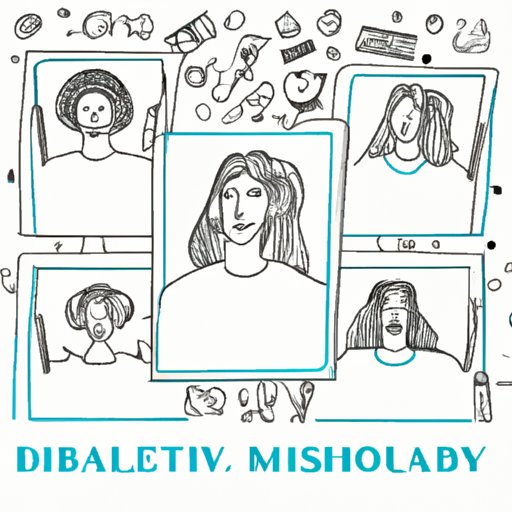
Introduction
Proving mental disability can be a challenging and complex process. Yet, it’s essential for individuals who are seeking disability benefits or other accommodations. Mental disability can include a range of conditions, from depression and anxiety to schizophrenia and bipolar disorder. In this article, we’ll provide a comprehensive guide on how to prove mental disability. We’ll discuss the criteria for mental disability, the process of proving mental disability, the importance of medical evidence, strategies for demonstrating impairment, tips for working with medical professionals, overcoming obstacles, and building a strong legal case.
Understanding the Criteria: A Guide to Proving Mental Disability
Mental disability is defined as a condition that significantly limits an individual’s daily activities, whether social, occupational, or emotional. The Social Security Administration (SSA) recognizes several categories of mental disabilities, including intellectual disorders, mood disorders, anxiety disorders, personality disorders, psychotic disorders, and neurocognitive disorders.
To prove mental disability, you must meet the following criteria:
- Your condition must be medically determinable: You must provide objective and subjective medical evidence of a diagnosed mental condition that causes the limitations.
- Your condition must be severe: Your condition must inhibit your ability to perform necessary work or daily activities significantly.
- Your condition must last for at least 12 months: To be eligible for disability benefits, your mental condition must be expected to last for at least a year or result in death.
Navigating the Process: Tips for Proving Mental Disability
To prove mental disability, you must first gather the necessary documentation, including medical records, treatment history, and personal accounts of your symptoms. It’s essential to ensure that this documentation thoroughly describes the effects of your condition on your daily life and work.
You’ll need to take several steps in the process of proving mental disability:
- Apply for disability benefits: You can start the application process by contacting the SSA and scheduling an appointment to discuss your case.
- Provide supporting documentation: Your supporting documentation should include medical records that prove your diagnosis, treatment history, and information about how your disability affects your life.
- Complete an interview: As part of the process, you’ll need to complete a phone or video interview with an SSA representative who will ask you questions related to your condition and work history.
- Wait for a decision: The SSA will review your application and the supporting documentation and determine if you qualify for disability benefits.
The Importance of Medical Evidence in Proving Mental Disability
Medical evidence plays a crucial role in establishing mental disability. When proving your condition, it’s essential to rely on diagnostic tools and medical evidence to provide a clear understanding of your condition and its impact on your daily life and work.
Some examples of medical tests used to detect mental disabilities include cognitive testing, psychiatric evaluations, and psychological testing. These tests help evaluate your mental functioning and provide objective evidence of your condition.
Medical professionals who diagnose and treat mental disabilities can also provide supporting evidence of your condition. These include psychiatrists, psychologists, licensed clinical social workers, and other mental health professionals.
Demonstrating Impairment: Strategies for Proving Mental Disability
To prove your mental disability, it’s crucial to document the effects of your condition in your daily life and work. Behavioral and cognitive impairments associated with mental disabilities can manifest in many ways, including difficulty remembering information, trouble concentrating, and physical symptoms such as headaches and fatigue.
You can demonstrate the impairment through self-reported symptoms, such as mood swings and anxiety attacks. It’s also helpful to track and document your symptoms over time to provide clear evidence of how your condition affects your daily life.
Expert Opinion: How Medical Professionals can help prove Mental Disability
Medical professionals play a critical role in diagnosing and treating mental disabilities. For this reason, they can provide expert opinions about the severity and effects of your condition, which can help build a strong case for mental disability.
It’s essential to work closely with your medical care providers to understand your condition and its effects on your daily life. A medical professional can help you provide necessary documentation and can be a valuable resource during the process of proving mental disability.

Overcoming Obstacles: Common Challenges in Proving Mental Disability
Proving mental disability can have its challenges. It’s not uncommon for applications to be rejected during the initial application process, and many applicants must go through the appeals process. Some typical challenges in proving mental disability include difficulty obtaining medical evidence, lack of documentation, and issues with the appeals process.
It’s essential to address these challenges by working with an attorney, understanding what documentation is necessary, and being persistent when pursuing disability benefits.
The Legal Perspective: How to Build a Strong Case for Mental Disability
The legal system approaches mental disability cases by relying on medical evidence to determine whether an individual meets the criteria for mental disability. To build a strong case, it’s essential to provide objective and subjective evidence of your condition that demonstrates how it impacts your daily life.
An attorney can provide valuable support during the process of proving mental disability, helping you navigate the legal system, compile the necessary documentation, and represent you during appeals, if necessary.
Conclusion
Proving mental disability can be challenging, but with the right resources and support, it’s possible to obtain the benefits you need and deserve. This article has provided a comprehensive guide to proving mental disability, including understanding the criteria, navigating the process, the importance of medical evidence, strategies for demonstrating impairment, working with medical professionals, overcoming obstacles, and building a strong legal case. We hope that this guide encourages individuals who are struggling with mental disabilities to seek the resources and support they need to obtain the benefits and accommodations they need.




